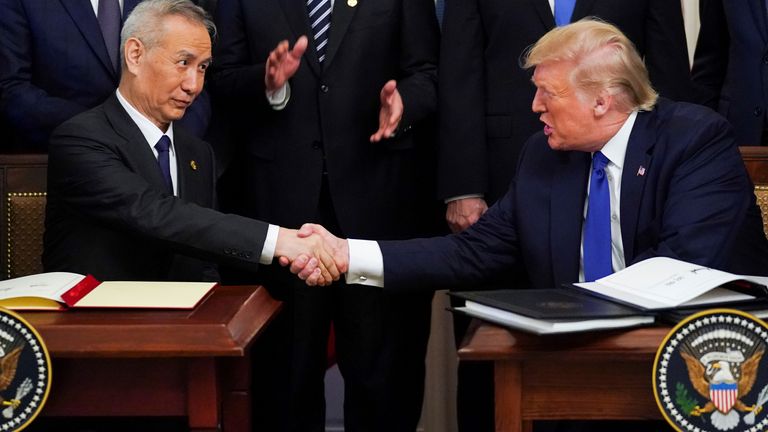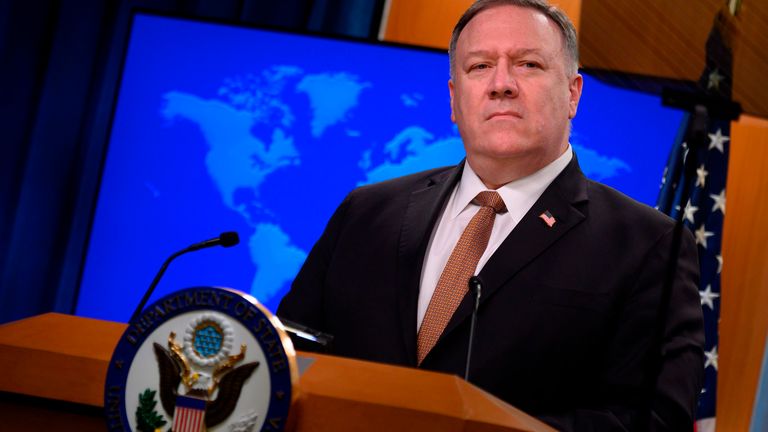Donald Trump has welcomed Britain’s decision to block Huawei from its 5G network – while China’s ambassador to the UK said it was “disappointing and wrong”.
Yesterday, Boris Johnson also banned the purchase of any new 5G equipment from the Chinese tech giant from the end of this year.
The US president praised the UK’s decision, saying: “We convinced many countries, many countries – and I did this myself for the most part – not to use Huawei, because we think it’s an unsafe security risk.
“It’s a big security risk and I talked many countries out of using it. If they want to do business with us, they can’t use it.”
Asked about Mr Trump’s assertion that he “convinced many countries” to ban Huawei, Health Secretary Matt Hancock stressed the UK government had made a “technical decision” to block the Chinese company.
He told Sky News’ Kay Burley @ Breakfast show: “We all know Donald Trump, don’t we?”
“All sorts of people can try to claim credit for the decision,” Mr Hancock added.
“But this was based on a technical assessment by the National Cyber Security Centre about how we can have the highest-quality 5G systems in the future.”
:: Listen to Divided States on Apple podcasts, Google Podcasts, Spotify, and Spreaker
Condemning the UK’s ban on Huawei, Chinese ambassador Liu Xiaoming tweeted: “Disappointing and wrong decision by the UK on #Huawei.
“It has become questionable whether the UK can provide an open, fair and non-discriminatory business environment for companies from other countries.”
The US is continuing to increase pressure on China, with Mr Trump signing an executive order that ends the special status of Hong Kong, citing the “oppressive actions” of Beijing.
Mr Trump said that the order would mean “no special privileges, no special economic treatment and no export of sensitive technologies” for Hong Kong.
“Hong Kong will now be treated the same as mainland China,” he said.
The president also signed a sanctions bill, approved by the US Congress, which could penalise banks doing business with Chinese officials implementing the controversial new security law in Hong Kong.
Supporters of the law say it is necessary to bring stability to Hong Kong but critics worry it is being used to crush Hong Kong’s traditional freedoms.
This week Hong Kong’s chief executive, Carrie Lam, said that primary elections held by pro-democratic parties last weekend, in which 600,000 people are estimated to have voted, could violate the new national security law.
According to state media, the Chinese government said it strongly opposed the latest US actions and would apply its own sanctions to US individuals and entities in response.
US-China relations have sunk to new lows but this week there has been a flurry of formal measures announced by both sides.
On Monday, US secretary of state Mike Pompeo declared in an official statement that China’s claims to the South China Sea were “completely unlawful”.
The Chinese foreign ministry said the US was “a troublemaker” and also announced sanctions on US defence contractor Lockheed Martin, which is helping to upgrade Taiwan’s Patriot surface-to-air missile system.
It had earlier announced sanctions on US officials, including senators Marco Rubio and Ted Cruz, in response to previous sanctions applied by the US to senior Chinese officials because of China’s treatment of minorities in Xinjiang.
Analysis – Why sanctions will hurt China more than US
Sanctions are flying back and forth across the Pacific but they will certainly hurt China more than the US.
Marco Rubio and Ted Cruz were unlikely to be planning a summer holiday to Xinjiang but many wealthy Chinese have substantial assets in the US and routinely send their children there to be educated: Chinese President Xi Jinping’s daughter studied at Harvard.
And Mr Trump’s comments on the UK’s ban of Huawei show how all-encompassing the US approach is. Yesterday a Huawei spokesperson said that the British decision was “about US trade policy and not security”.
Mr Trump added some substance to that, saying: “If [countries] want to do business with us, they can’t use it”.
:: Listen to the Daily podcast on Apple Podcasts, Google Podcasts, Spotify, Spreaker
Trade and security, though, are now two sides of the same coin. China itself has often been happy to conflate the two.
Mr Trump also said the US “convinced” other countries to ban Huawei. In truth, he cajoled them. Washington had long lobbied the British government to reject Huawei, a campaign which London successfully resisted.
But US sanctions on Huawei changed that calculation, both technically, as the UK government noted its new security concerns, but also politically: the sanctions gave British politicians another opportunity (or cover) to respond to a harder attitude from backbenchers and the public on China in 2020, and to change its position.
The UK ban on Huawei is proof of the US’s enduring hard power.




